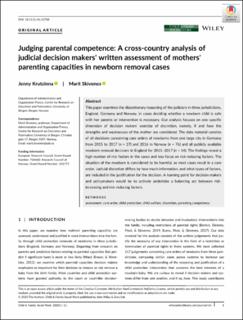Judging parental competence: A cross‐country analysis of judicial decision makers' written assessment of mothers' parenting capacities in newborn removal cases
Journal article, Peer reviewed
Published version

Åpne
Permanent lenke
https://hdl.handle.net/11250/2720219Utgivelsesdato
2020Metadata
Vis full innførselSamlinger
- Department of Government [457]
- Registrations from Cristin [9791]
Originalversjon
10.1111/cfs.12788Sammendrag
This paper examines the discretionary reasoning of the judiciary in three jurisdictions, England, Germany and Norway, in cases deciding whether a newborn child is safe with her parents or intervention is necessary. Our analysis focuses on one specific dimension of decision makers' exercise of discretion, namely, if and how the strengths and weaknesses of the mother are considered. The data material consists of all decisions concerning care orders of newborns from one large city in Germany from 2015 to 2017 (n = 27) and 2016 in Norway (n = 76) and all publicly available newborn removal decisions in England for 2015–2017 (n = 14). The findings reveal a high number of risk factors in the cases and less focus on risk‐reducing factors. The situation of the newborn is considered to be harmful, as most cases result in a care order. Judicial discretion differs by how much information, and what types of factors, are included in the justification for the decision. A learning point for decision makers and policymakers would be to actively undertake a balancing act between risk‐increasing and risk‐reducing factors.
